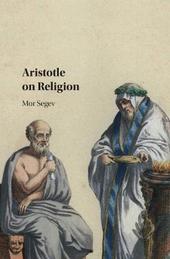
|
Aristotle on Religion
Hardback
Main Details
| Title |
Aristotle on Religion
|
| Authors and Contributors |
By (author) Mor Segev
|
| Physical Properties |
| Format:Hardback | | Pages:198 | | Dimensions(mm): Height 235,Width 155 |
|
| Category/Genre | Western philosophy - Ancient to c 500
Philosophy of religion |
|---|
| ISBN/Barcode |
9781108415255
|
| Classifications | Dewey:185 |
|---|
| Audience | | Professional & Vocational | |
|---|
| Illustrations |
Worked examples or Exercises; 2 Tables, black and white; 3 Line drawings, black and white
|
|
Publishing Details |
| Publisher |
Cambridge University Press
|
| Imprint |
Cambridge University Press
|
| Publication Date |
2 November 2017 |
| Publication Country |
United Kingdom
|
Description
Aristotle is a severe critic of traditional religion, believing it to be false, yet he also holds that traditional religion and its institutions are necessary if any city, including the ideal city he describes in the Politics, is to exist and flourish. This book provides, for the first time, a coherent account of the socio-political role which Aristotle attributes to traditional religion despite his rejection of its content. Mor Segev argues that Aristotle thinks traditional religion is politically necessary because it prepares the ground for what he considers the pinnacle of human endeavor: attaining the knowledge of first philosophy, whose objects are real beings worthy of being called gods. Developing this interpretation, Segev goes on to analyze Aristotle's references to the myths of traditional Greek religion, and to assess his influence on medieval Jewish and Christian theology and philosophy of religion.
Author Biography
Mor Segev is Assistant Professor of Philosophy at the University of South Florida. His work includes articles published or forthcoming in Oxford Studies in Ancient Philosophy, the British Journal for the History of Philosophy, Polis, History of Philosophy Quarterly and Classical World.
Reviews'Here is the problem: Aristotle seems clearly to reject the traditional Olympian gods. His own conception of god (see especially Metaphysics) seems to have no religious significance; for whatever else this god knows (a subject of much debate), it certainly does not know particulars, including humans and their characters, actions, and futures ... In Aristotle on Religion, Segev superbly lays out the problem and offers a solution that does not attempt to resurrect the Olympian gods, and that goes beyond mere social stability.' Robert Mayhew, Journal of the History of Philosophy
|